 That time of year has come when raptors are on the wing and a young man’s thoughts turn to… Osprey? It’s true. Come September, the denizens of Seattle aren’t the only ones watching seahawks. Nature lovers around the world turn out in hordes to observe the osprey’s southerly migration. However, none have pursued this peregrination as ardently as David Gessner. Having established his bona fides as an unabashed and insightful admirer of this incredible species in the book, Return of the Osprey, he then apparently took leave of his senses, following the migratory route of ospreys from New England to South America with a detour through a certain embargoed Caribbean island along the way. Soaring with Fidel is the tale of that momentous journey.
That time of year has come when raptors are on the wing and a young man’s thoughts turn to… Osprey? It’s true. Come September, the denizens of Seattle aren’t the only ones watching seahawks. Nature lovers around the world turn out in hordes to observe the osprey’s southerly migration. However, none have pursued this peregrination as ardently as David Gessner. Having established his bona fides as an unabashed and insightful admirer of this incredible species in the book, Return of the Osprey, he then apparently took leave of his senses, following the migratory route of ospreys from New England to South America with a detour through a certain embargoed Caribbean island along the way. Soaring with Fidel is the tale of that momentous journey.
Soaring with Fidel: An Osprey Odyssey from Cape Cod to Cuba and Beyond shines as an encomium to seahawks in specific, but more generally to all creatures driven ruthlessly by the relentless urge to move in response to seasonal cues. We expect this behavior in birds; as the length of days dwindles, great flocks of raptors and passerines overhead precede the turning of leaves but signal the inevitability of winter with equal assurance. One of the key strengths of Soaring with Fidel, however, is its assertion that humans are also vulnerable to a wanderlust powrful enough to carry a body over mountains, across oceans, and past common sense. David Gessner states authoritatively right at the beginning of his book that humans are never happier than when they are chasing something. He then proceeds to prove that point.
Gessner’s journey begins at Cape Cod, as advertised, just as ospreys are nosing southward towards ancestral wintering grounds. The conceit of the tale is that he attempts to follow one specific bird, tagged with the moniker Fidel for what should be obvious reasons. The intrepid author actually makes it against all odds, not to mention regulations, to Cuba. On his winding way, he breezes through a variety of birding hotspots and osprey enclaves, meeting a cast of characters united in their pure passion for avifauna. I won’t reveal all of the locations on his itinerary; suffice to say, if osprey gather in a place in decent numbers, David Gessner has probably been there.
The writing in Soaring with Fidel is crisp, certain in its rendering of the birds that drive the narrative and the splendid locales through which it is driven. Those afraid that a work depicting a single species might become tiresome need not worry. Gessner’s treatment of ospreys and other birds never seems pedantic or overwrought. Instead, he reveals facts with such fascination and finesse that you can’t help but share his enthusiasm.
While Gessner is both the protagonist and chronicler of this rollicking adventure, I found his presence perhaps a bit too palpable. The details of his improbable journey, the vibrant stops along the way, and those astonishing raptors are sublime, keenly rendered by an artist in full command of his instrument and senses. But when the narrative veers towards the messy particulars of his own role in the drama, the spell is sometimes broken. The disruption stems from two nagging flaws. First, the author repeatedly flouts the TMI rule, revealing far Too Much Information about himself and his bodily functions. This tendency may be forgivable, perhaps even desirable by some readers. The second flaw, however, was a distraction throughout that ultimately tainted the book for me. Simply put, as a father of young children, I could not accept that he left his one-year old daughter behind to embark on this grand osprey escapade. This lone fact took me out of the story at key points, making it difficult to empathize with Gessner through his series of setbacks and serendipities.
Ultimately, Soaring with Fidel reveals itself a fun book with serious insights into human obsession. Caught in the throes of an elemental urge to move, Gessner muses how it was exhilarating to simplify life into quest. If you can accept the premise that a man can get swept up in, as the author describes it, the “great unsettling” and carried on the wings of ospreys to adventure and discovery, this book is undoubtedly for you.
UPDATE: David Gessner responds to my review in the comments below. Don’t miss it!






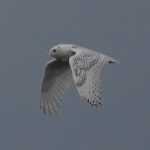
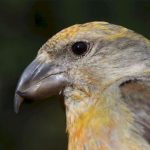
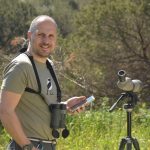

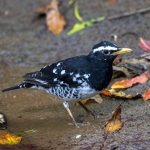
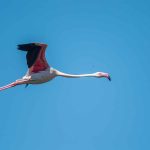
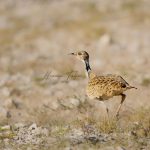
Wow that’s great! Return of the Osprey is the book that sparked my initial interest in birds in the first place. Look forward to checking this one out.
This is a really informative post. I like bird watching and will visit your blog for more great info.
Thanks for the fine review, Mike. In Soaring with Fidel, Gessner’s long separation from his wife and child reminded me of a few obsessed birders I know. A new biography of Roger Tory Peterson (by Douglas Carlson) quotes his son as remembering Peterson as someone who was “just passing through” on the way to the next adventure. But Gessner presents a very different picture of intense attachment to family an essay, “Trickster in the City,” in his terrific book Sick of Nature.
I was interested by Mike’s comments on this guy going off and leaving his family. The fear of being tied down is precisely why I have never had kids (and I don’t regret it for one second, I’ve done many things I could not have if I’d been tied down to a family). However, there are a lot of people who have both and some of them probably feel they need to get away from the ties and to be honest I don’t blame them – they’re probably as badly suited to family life as I am, but maybe they should have thought about that more before they actually went and had the kid.
At least the kid still has a dad, mine died when I was two – that’s worse, albeit unavoidable.
I really appreciate these excellent comments. Julie, thanks to your insights, I might be willing to change my opinion of Gessner’s parenting instincts by reading Sick of Nature, which is highly regarded. You also reminded me of Dan Koeppel’s book, To See Every Bird on Earth, in which world birding created some friction in the family.
Vectis Birder, I agree completely with you that having kids precludes many other enticing experiences, at least for a while. I can barely get away for a couple of hours of birding on a weekend, let alone chase Ospreys to Cuba. However, my kids are very young right now. When they’re older, you bet I’ll be jetsetting! I’ll be writing more about my feelings on this soon.
Dear Mike,
Thanks for your great comments on my book. You seem to have read it in exactly the spirit I hoped people would.
As for the two criticisms, I won’t try to defend the first. As I’ve said in other books, I have a sweet tooth in the personal (which shows in my love of Roth and Woody Allen) and realize that my aesthetic errs on the side of the revealing.
But the second critique I must defend! It may seem like I left Hadley behind for a year, but that was not the case. The book is divided into four trips, and each of those trips lasts exactly a week. I was away from my family for 7 days in September when I traveled from cape Cod back to Carolina. Another seven days in October in Cuba. The next seven day trip to Venezuela didn’t take place until February. And the final trip north with the migration took place with Hadley at my side. So 21 days in a year. (I’ll put those numbers up against my lawyer brother-in-law.)
Hope this doesn’t sound overly defensive. I greatly enjoyed your take on the book. Best, David G.
P.S. For a piece on fatherhood please google “Learning to Surf.” The essay is about Hadley’s first year. It just won the John Burroughs award for best nature essay of 2006. (Sorry to end by bragging.)
David, thanks so much for your warm response to my admittedly opinionated review. You really have nothing to defend. Your excellent book caught me at a time when I’m working through the challenge of reconciling my role as a father with other pressing interests. Had I done the math you’ve just laid out, I could have gotten off my high horse and really immersed myself in your tale. I’m glad you set the record straight so that other readers can approach Soaring with Fidel unencumbered with that particular piece of baggage!
Thanks for stopping by 10,000 Birds, hopefully not for the last time. I’m looking forward to reading more of your work, starting with the aforementioned award-winning essay!